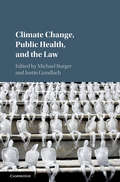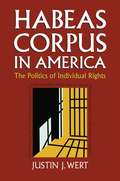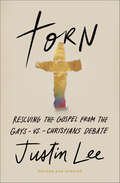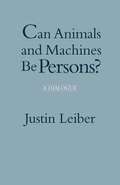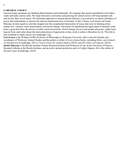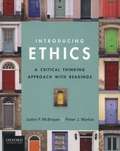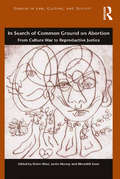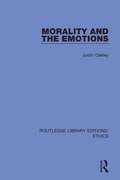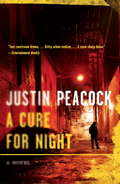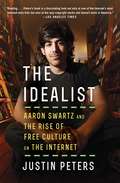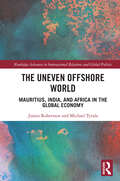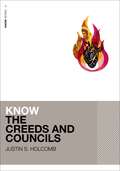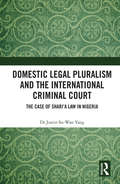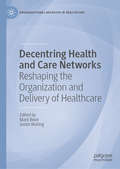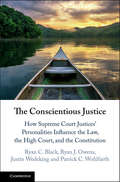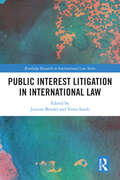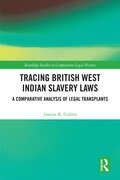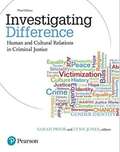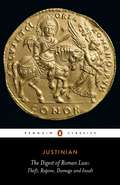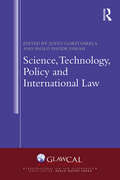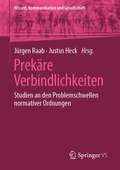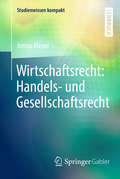- Table View
- List View
Climate Change, Public Health, and the Law
by Michael Burger Justin GundlachClimate Change, Public Health, and the Law provides the first comprehensive explication of the dynamic interactions between climate change, public health law, and environmental law, both in the United States and internationally. Responding to climate change and achieving public health protections each require the coordination of the decisions and behavior of large numbers of people. However, they also involve interventions that risk compromising individual rights. The challenges involved in coordinating large-scale responses to public health threats and protecting against the invasion of rights, makes the law indispensable to both of these agendas. Written for the benefit of public health and environmental law professionals and policymakers in the United States and in the international public health sector, this volume focuses on the legal components of pursuing public health goals in the midst of a changing climate. It will help facilitate efforts to develop, improve, and carry out policy responses at the international, federal, state, and local levels.
The Power of American Governors
by Thad Kousser Justin H. PhillipsWith limited authority over state lawmaking, but ultimate responsibility for the performance of government, how effective are governors in moving their programs through the legislature? This book advances a new theory about what makes chief executives most successful and explores this theory through original data. Thad Kousser and Justin H. Phillips argue that negotiations over the budget, on the one hand, and policy bills on the other are driven by fundamentally different dynamics. They capture these dynamics in models informed by interviews with gubernatorial advisors, cabinet members, press secretaries, and governors themselves. Through a series of novel empirical analyses and rich case studies, the authors demonstrate that governors can be powerful actors in the lawmaking process, but that what they're bargaining over - the budget or policy - shapes both how they play the game and how often they can win it. In addition to assessing the power of American governors, this book contributes broadly to our understanding of the determinants of executive power.
Habeas Corpus in America: The Politics of Individual Rights
by Justin J. WertFrom the author: During the summer of 2001 I set out to research and write about habeas corpus, the purported Great Writ of Liberty. Like many others before me--and, I hope, many after me--I was first intrigued with Abraham Lincoln's use (or nonuse) of the writ during the first months of his fateful presidency. Speaking before a Congress that he called into special session on 4 July 1861, Lincoln asked those representatives who still remained with Union a question that we today still have not answered adequately: "Are all the laws but one to go unexecuted and the government itself go to pieces, lest that one be violated?" Few questions, I thought, were as important as this one, not only from the perspective of political science, but also from the perspective of all citizens who take seriously a necessary sense of duty to country. I would now go forth and attempt to chart the contours of Lincoln's question, taking as my case study his controversial suspension of habeas during the Civil War years. I was confident that a sustained look at habeas's suspension could yield new perspectives and new ways of understanding this immensely important question.
Torn: Rescuing the Gospel from the Gays-vs.-Christians Debate
by Justin LeeNewly revised and updated! An evangelical Christian examines the impact of sexuality, the LGBTQ+ movement, and the future of the church in this thoughtful, deeply researched guide to navigating and mending the social and political division in our families and churches. Nicknamed "God Boy" by his peers, Lee knew that he was called to a life in evangelical Christian ministry. But questions about his own sexuality forced him to rethink his &“love the sinner, hate the sin&” approach, sending him on a journey to better understand the Bible, the science, and the history of the church&’s gay debate—eventually leading him to become one of the most respected voices on the subject on both sides of the divide. Filled with personal stories and careful research, Torn provides insightful, practical guidance for all committed Christians who wonder how to relate to gay friends or family members—or who struggle with their own sexuality. Torn has been a trusted resource for over a decade, and this updated edition features new material to address the impact and aftermath of the &“ex-gay&” movement, gender identity and the broader LGBTQ+ movement, and an updated and expanded look at where the overall affirming Christian movement is going. It also features new practical recommendations for combating the increased polarization that threatens to tear us apart.
Can Animals And Machines Be Persons?: A Dialogue
by Justin Leiber"This is a dialogue about the notion of a person, of an entity that thinks and feels and acts, that counts and is accountable. Equivalently, it's about the intentional idiom --the well-knit fabric of terms that we use to characterize persons. Human beings are usually persons (a brain-dead human might be considered a human but not a person). However, there may be persons, in various senses, that are not human beings. Much recent discussion has focused on hypothetical computer-robots and on actual nonhuman great apes. The discussion here is naturalistic, which is to say that count and accountability are, at least initially, presumed to be naturally well-knit with the possession of a cognitive and affective life. " --Justin Leiber, from the Introduction
Carceral Logics: Human Incarceration and Animal Captivity
by Lori Gruen Justin MarceauCarceral logics permeate our thinking about humans and nonhumans. We imagine that greater punishment will reduce crime and make society safer. We hope that more convictions and policing for animal crimes will keep animals safe and elevate their social status. The dominant approach to human-animal relations is governed by an unjust imbalance of power that subordinates or ignores the interest nonhumans have in freedom. <p><p>In this volume Lori Gruen and Justin Marceau invite experts to provide insights into the complicated intersection of issues that arise in thinking about animal law, violence, mass incarceration, and social change. Advocates for enhancing the legal status of animals could learn a great deal from the history and successes (and failures) of other social movements. Likewise, social change lawyers, as well as animal advocates, might learn lessons from each other about the interconnections of oppression as they work to achieve liberation for all. This title is also available as Open Access on Cambridge Core.
Introducing Ethics: A Critical Thinking Approach With Readings
by Peter Markie Justin McBrayerIntroducing Ethics: A Critical Thinking Approach with Readings combines guiding commentary and questions with a rich selection of concise, carefully edited, and accessible readings on ethical theory and contemporary moral issues. <P><P>This unique introduction shows students how to do philosophy by first analyzing texts--identifying ethical positions and the arguments that support them--and then evaluating the truth of those positions and the soundness of the arguments. <P><P>In doing so, it provides students with a uniquely engaging introduction to ethics that also hones their critical thinking skills.
In Search of Common Ground on Abortion: From Culture War to Reproductive Justice (Gender in Law, Culture, and Society)
by Robin West Justin Murray Meredith EsserThis book brings together academics, legal practitioners and activists with a wide range of pro-choice, pro-life and other views to explore the possibilities for cultural, philosophical, moral and political common ground on the subjects of abortion and reproductive justice more generally. It aims to rethink polarized positions on sexuality, morality, religion and law, in relation to abortion, as a way of laying the groundwork for productive and collaborative dialogue. Edited by a leading figure on gender issues and emerging voices in the quest for reproductive justice - a broad concept that encompasses the interests of men, women and children alike - the contributions both search for 'common ground' between opposing positions in our struggles around abortion, and seek to bring balance to these contentious debates. The book will be valuable to anyone interested in law and society, gender and religious studies and philosophy and theory of law.
Morality and the Emotions
by Justin OakleyOriginally published in 1992 this book attacks many recent philosophical and psychological theories of the emotions and argues that our emotions themselves have intrinsic moral significance. He demonstrates that a proper understanding of the emotions reveals the fundamental role they play in our moral lives and the practical consequences that arise from being morally responsible for our emotions.
A Cure for Night
by Justin PeacockA Washington Post Best Book of the Year Edgar Nominee- Best First Novel Joel Deveraux is a rising star at a white-shoe law firm in Manhattan. But after a drug-related scandal costs him his job and nearly his law license, he slides down the corporate ladder to the Booklyn Defenders office. He arrives just in time for a high profile murder case, where he is assigned to work with the tough and savvy Myra Goldstein. With pressure from their boss and interest from the tabloids, they take on the defense of a black pot dealer from the projects who is charged with the murder of a white college student. Joel quickly learns that urban criminal law is a form of combat where the best story wins-but who's telling the truth and who's lying are matters of life and death.
The Idealist
by Justin PetersA smart, lively history of the Internet free culture movement and its larger effects on society--and the life and shocking suicide of Aaron Swartz, a founding developer of Reddit and Creative Commons--from Slate correspondent Justin Peters.Aaron Swartz was a zealous young advocate for the free exchange of information and creative content online. He committed suicide in 2013 after being indicted by the government for illegally downloading millions of academic articles from a nonprofit online database. From the age of fifteen, when Swartz, a computer prodigy, worked with Lawrence Lessig to launch Creative Commons, to his years as a fighter for copyright reform and open information, to his work leading the protests against the Stop Online Piracy Act (SOPA), to his posthumous status as a cultural icon, Swartz's life was inextricably connected to the free culture movement. Now Justin Peters examines Swartz's life in the context of 200 years of struggle over the control of information. In vivid, accessible prose, The Idealist situates Swartz in the context of other "data moralists" past and present, from lexicographer Noah Webster to ebook pioneer Michael Hart to NSA whistleblower Edward Snowden. In the process, the book explores the history of copyright statutes and the public domain; examines archivists' ongoing quest to build the "library of the future"; and charts the rise of open access, copyleft, and other ideologies that have come to challenge protectionist IP policies. Peters also breaks down the government's case against Swartz and explains how we reached the point where federally funded academic research came to be considered private property, and downloading that material in bulk came to be considered a federal crime. The Idealist is an important investigation of the fate of the digital commons in an increasingly corporatized Internet, and an essential look at the impact of the free culture movement on our daily lives and on generations to come.
The Idealist: Aaron Swartz and the Rise of Free Culture on the Internet
by Justin PetersThis smart, “riveting” (Los Angeles Times) history of the Internet free culture movement and its larger effects on society—and the life and shocking suicide of Aaron Swartz, a founding developer of Reddit and Creative Commons—written by Slate correspondent Justin Peters “captures Swartz flawlessly” (The New York Times Book Review).Aaron Swartz was a zealous young advocate for the free exchange of information and creative content online. He committed suicide in 2013 after being indicted by the government for illegally downloading millions of academic articles from a nonprofit online database. From the age of fifteen, when Swartz, a computer prodigy, worked with Lawrence Lessig to launch Creative Commons, to his years as a fighter for copyright reform and open information, to his work leading the protests against the Stop Online Piracy Act (SOPA), to his posthumous status as a cultural icon, Swartz’s life was inextricably connected to the free culture movement. Now Justin Peters examines Swartz’s life in the context of 200 years of struggle over the control of information. In vivid, accessible prose, The Idealist situates Swartz in the context of other “data moralists” past and present, from lexicographer Noah Webster to ebook pioneer Michael Hart to NSA whistleblower Edward Snowden. In the process, the book explores the history of copyright statutes and the public domain; examines archivists’ ongoing quest to build the “library of the future”; and charts the rise of open access, the copyleft movement, and other ideologies that have come to challenge protectionist intellectual property policies. Peters also breaks down the government’s case against Swartz and explains how we reached the point where federally funded academic research came to be considered private property, and downloading that material in bulk came to be considered a federal crime. The Idealist is “an excellent survey of the intellectual property battlefield, and a sobering memorial to its most tragic victim” (The Boston Globe) and an essential look at the impact of the free culture movement on our daily lives and on generations to come.
The Uneven Offshore World: Mauritius, India, and Africa in the Global Economy (Routledge Advances in International Relations and Global Politics)
by Justin Robertson Michael TyralaInformed by world-systems analysis, this book examines the shifting patterns of accommodation and resistance to the offshore world, with a particular focus on Mauritius as a critical but underappreciated offshore node mediating foreign investment into India and Africa. Drawing on a large pool of financial data and elite interviews, the authors present the first detailed comparative study of the Mauritius–India and Mauritius–Africa offshore relationships. These relationships serve as indicative test cases of the contemporary global tax reform agenda and its promise to rein in offshore finance. Whereas India’s economic power and multilateral track record have enabled it to actively shape this agenda and implement it in a robust manner, most African countries have found themselves either unable to meet its stringent criteria or unwilling to do so out of fear that it might discourage investment. Its impact on offshore financial centers has likewise been limited. A few of the least sophisticated ones appear to have fallen by the wayside, but the rest have either remained largely unaffected, or, like Mauritius, succeeded in consolidating their operations and surviving the current round of regulatory headwinds. The findings suggest that the contemporary global tax reform agenda has thus far not only failed to make good on its promise but also actually reinforced numerous existing power hierarchies. The Uneven Offshore World is written in an accessible style and aimed at readers without specialized knowledge of tax issues.
Know the Creeds and Councils (KNOW Series)
by Justin S. HolcombIn every generation, the Christian church must interpret and restate its bedrock beliefs, answering the challenges and concerns of the day. This accessible overview walks readers through centuries of creeds, councils, catechisms, and confessions—not with a dry focus on dates and places, but with an emphasis on the living tradition of Christian belief and why it matters for our lives today.As a part of the KNOW series, Know the Creeds and Councils is designed for personal study or classroom use, but also for small groups and Sunday schools wanting to more deeply understand the foundations of the faith.Each chapter covers a key statement of faith and includes a discussion of its historical context, a simple explanation of the statement’s content and key points, reflections on contemporary and ongoing relevance, and discussion questions.
Domestic Legal Pluralism and the International Criminal Court: The Case of Shari'a Law in Nigeria
by Justin Su-Wan YangThis book explores how the unique historical development of Islamic Shari’a criminal law alongside English common law in northern Nigeria has created a hybridised criminal legal system through a pluralist dynamic of mutual accommodation. It studies how this system may potentially be accommodated by the International Criminal Court. The work examines how this could be accommodated through the current understanding and operation of complementarity, and that it could ultimately prove to be preferable in encouraging the Shari’a courts to exercise criminal justice over the radical insurgents in northern Nigeria. These courts would have the unprecedented ability to combine binding adjudicative judgments together with religious interpretation and guidance, which can directly combat the predominantly unchallenged domain of ideology by extremist actors. It is submitted that these pluralist perspectives are timely and welcome, given the undeniably Western European foundations of modern International Criminal Law. In exploring such potential avenues, our shared understanding of modern international criminal justice is widened to necessarily include other stakeholders beyond its Western founders. It is the aim and hope that such interactions and engagements with non-Western traditions and cultures will lead to a greater shared ownership of the international criminal justice project, which will only strengthen the global fight against impunity. The book will be essential reading for academics, researchers and policy-makers working in the areas of International Criminal Law, Legal Pluralism, Islamic Shari’a Law, Nigeria, and religiously-inspired violence.
Decentring Health and Care Networks: Reshaping the Organization and Delivery of Healthcare (Organizational Behaviour in Healthcare)
by Mark Bevir Justin WaringNetworks have become a prominent template for public service governance. Often seen as an alternative to hierarchies and contracts, networks cross institutionalized organizational or sectoral boundaries to promote collaboration and the sharing of resources when addressing complex problems. Nowhere is this more the case than in the field of health services modernization and improvement. Comprising unique empirical contributions, drawn primarily from the experience of the UK National Health Service (NHS), this edited collection develops a ‘decentred’ analysis of health and care networks. Contributors look beyond particular structures or patterns of governance and focus instead on the interpretation of the meaningful practices of policy actors as they encounter and enact policy instruments and structures. The approach offers a distinct form of analysis that deepens and enriches more traditional public policy accounts of network governance. It recognizes the influence of local history, highlights the influence of dominant economic, technical and corporate narratives, and acknowledges the continued influence of biomedical knowledge and professional expertise. Offering practical insight for current and future service leaders about the challenges of implementing, managing and working within networks, this book draws out key messages for practitioners and researchers alike.
The Conscientious Justice: How Supreme Court Justices' Personalities Influence the Law, the High Court, and the Constitution
by Ryan C. Black Ryan J. Owens Justin Wedeking Patrick C. WohlfarthUnited States Supreme Court justices make decisions that have a profound impact on American society. Empirical legal scholars have portrayed justices as either single-minded or strategic seekers of policy, and there is little room in these theories for things like law, reputation, or personality. This book offers a fresh perspective that will jar Supreme Court scholarship out of complacency. It argues that justices' personalities influence their behavior, which in turn influences legal development and the United States Constitution. This impressive group of authors exhaustively examine every part of the Court's decision-making process, and focus on the trait of conscientiousness and how it influences justices over nine different empirical contexts, from agenda setting to writing the Court's opinions. The Conscientious Justice is an important and comprehensive account of judging that restructures existing approaches to analyzing the High Court.
U.S. Supreme Court Opinions And Their Audiences
by Ryan C. Black Ryan J. Owens Justin Wedeking Patrick C. WohlfarthThis book is the first study specifically to investigate the extent to which US Supreme Court justices alter the clarity of their opinions based on expected reactions from their audiences.<P><P> The authors examine this dynamic by creating a unique measure of opinion clarity and then testing whether the Court writes clearer opinions when it faces ideologically hostile and ideologically scattered lower federal courts; when it decides cases involving poorly performing federal agencies; when it decides cases involving states with less professionalized legislatures and governors; and when it rules against public opinion. The data shows the Court writes clearer opinions in every one of these contexts, and demonstrates that actors are more likely to comply with clearer Court opinions.
Public Interest Litigation in International Law (Routledge Research in International Law)
by Justine Bendel and Yusra SuediIn a world of growing public interest over global matters, and criticisms over multilateralism to adequately address them, the role of international courts and tribunals in the resolution of disputes is shifting. A central aspect of this shift is whether and how international courts and tribunals can be used to resolve such disputes in the public interest. This practice, referred to as public interest litigation, is the object of this collection, which identifies some recent developments, trends and prospects in this growing practice. Its aim is to assess the degree to which the bilateral design of international courts and tribunals can adapt to the shift towards a public approach to international litigation. Engaging with various fields where public interest litigation exists - such as human rights, climate change, global health and criminal law - it identifies recent developments, trends and prospects in this practice. The selected pieces provide a flavour of the types of issues that have arisen before international judicial bodies - for instance the International Court of Justice, the International Tribunal for the Law of the Sea, international arbitral tribunals, regional human rights bodies or criminal courts - and explores issues that may arise in the future.
Tracing British West Indian Slavery Laws: A Comparative Analysis of Legal Transplants (Routledge Studies in Comparative Legal History)
by Justine K. CollinsThis book provides a legal historical insight into colonial laws on enslavement and the plantation system in the British West Indies. The volume is a work of comparative legal history of the English-Speaking Caribbean which concentrates on how the laws of England served to catalyse the slavery laws and also legislation pertaining to post-emancipation societies. The book illustrates how these “borrowed” laws from England not only developed colonial slavery laws within the English speaking Caribbean but also inspired the slavery codes of a number of North American plantation systems. The cusp of the work focuses on the interconnectivities among the English-speaking slave holding Atlantic and how persons, free and unfree, moved throughout the system and brought laws with them which greatly affected the various enslaved societies. The book will be essential reading for students and researchers interested in colonial slavery, Caribbean Studies, Black and Atlantic history.
Investigating Difference: Human and Cultural Relations in Criminal Justice
by Lynn Jones Justine Miller Sarah PriorFor courses that investigate race, class, and gender issues in Criminal Justice. <p><p> A deep exploration of justice―its meaning and administration―through consideration of difference Investigating Difference examines the full range of individual differences across the entire criminal justice system. <p><p>With a focus on positive solutions, the Third Edition moves beyond a prioritization of race to emphasize the multitude of social identity categories that matter in the justice system. Written by esteemed faculty and leading scholars in the field, this edition includes new chapters on intersectionality, specialty courts, and whiteness; newly authored and conceptualized chapters on gender, sexual orientation and gender identity, victimization, African Americans, Asian Americans, immigration, disability, and religion; a look at globalization and its impact on victims, offenders, and practitioners; and updated statistics and policy information throughout.
The Digest of Roman Law: Theft, Rapine, Damage and Insult
by JustinianCodified by Justinian I and published under his aegis in A.D. 533, this celebrated work of legal history forms a fascinating picture of ordinary life in Rome.
Science, Technology, Policy and International Law (ISSN)
by Justo Corti Varela Paolo Davide FarahThis book presents innovative insights into the intersections between science, technology, and society, and particularly their regulation by the law. Departing from the idea that law and science have similar methods and objectives, the book deals with problems, and solutions, that source from these interactions: concerns on how to integrate scientific evidence into trials, how to best regulate new technologies, or whether technological innovations could improve democratic legitimacy, create new regulatory tools or even new spaces of regulation, and what is the impact on the society. The edited collection, by building on a functionalist and comparatist approach, offers answers to how to best integrate law, science, and technology in policy-making and reviews the current attempts made at the transnational and international levels. Case studies, ranging from emerging technologies via environmental protection to statistics, are complemented by a solid theoretical framework, all of which seek to provide readers with tools for critical thinking in the reassessment of the relationship among theory, practice, political goals, and international regulation.
Prekäre Verbindlichkeiten: Studien an den Problemschwellen normativer Ordnungen (Wissen, Kommunikation und Gesellschaft)
by Jürgen Raab Justus HeckVertrauensverluste und Glaubwürdigkeitskrisen von gesellschaftlichen Institutionen sind Ausdruck der Pluralisierung von Werten und Normen und der zunehmenden Verhandelbarkeit, Labilität und Ungewissheit für allgemein und beständig genommener Verbindlichkeiten. Die im Band versammelten Studien zu Sprechweisen, Freiheitsdiskussionen, Rechtsfindungen und Polizeiarbeiten geben solch prekäre Verbindlichkeiten als Problemschwellen normativer Ordnungen zu erkennen. Ihre Komplexität fordert die Geistes-, Kultur und Sozialwissenschaften heraus, tradierte Verständnisse, Begriffe und Methoden zu prüfen, zu aktualisieren, zu erweitern und zu verfeinern. Diese Sondierungs- und Präzisierungsarbeiten sind nur interdisziplinär zu leisten. Hierfür stellt das hier unterbreitete Forschungskonzept der prekären Verbindlichkeiten ein vielversprechendes Potential in Aussicht.
Wirtschaftsrecht: Handels- und Gesellschaftsrecht (Studienwissen kompakt)
by Justus MeyerDieses Lehrbuch führt kompakt in das Gebiet des Handels- und Gesellschaftsrechts ein. Es klärt zentrale Begriffe, verweist auf relevante Rechtsquellen und erläutert zugrunde liegende Prinzipien sowie den richtigen Umgang mit diesen. Auf diese Weise werden einzelne Zusammenhänge verdeutlicht und ein wesentliches Verständnis für die Grundlagen des Rechtsgebiets vermittelt. Kurze Lerneinheiten, übersichtliche didaktische Module sowie die begleitende Lernkontrolle sorgen für eine nachhaltige Wissensvermittlung. Das Buch richtet sich damit an alle, die sich mit Fragen des Handels- und Gesellschaftsrechts im Rahmen ihrer Aus- und Weiterbildung (auch im Nebenfach) sowie ihrer beruflichen Praxis auseinandersetzen.
